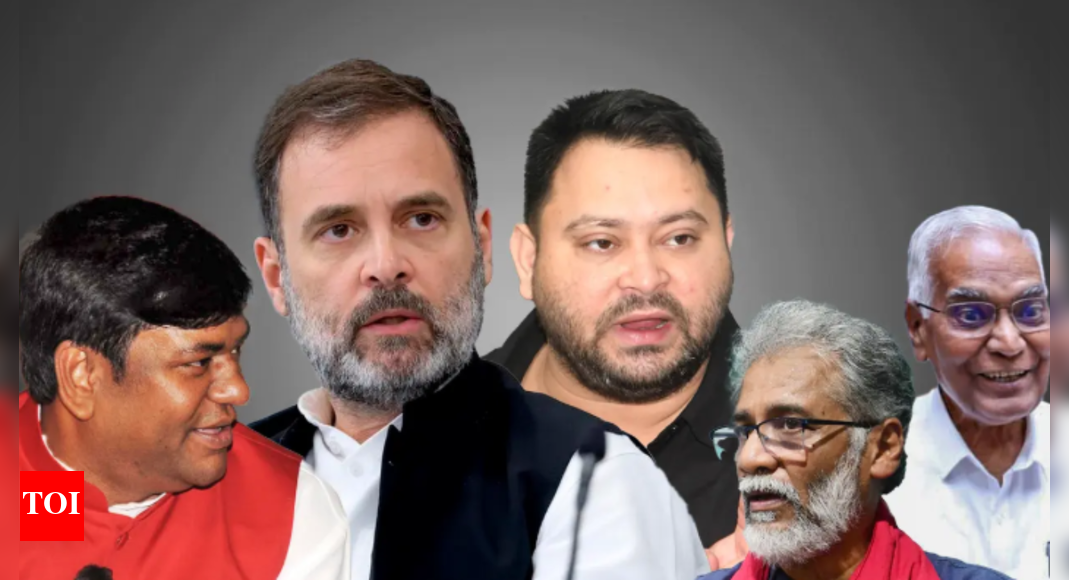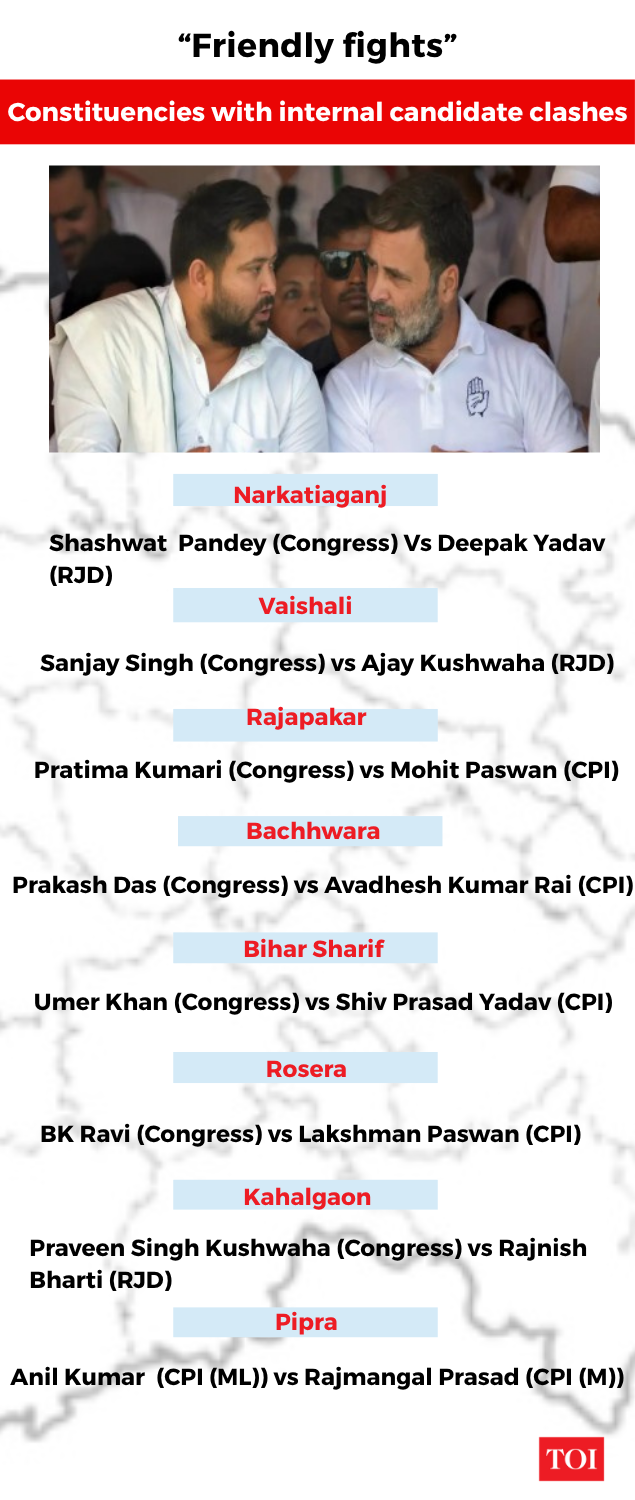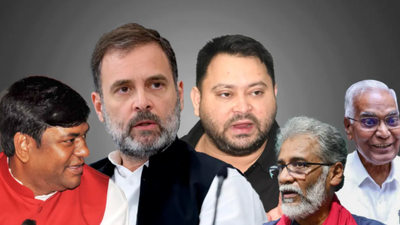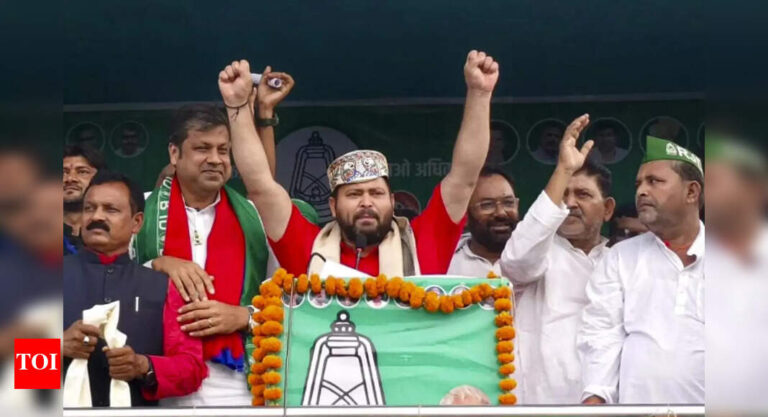
The Bihar 2025 assembly elections delivered a historic defeat to the Mahagathbandhan (MGB) with latest trends showing that the alliance may secure just 36 seats. Despite high expectations and an alliance that sought to challenge the incumbent National Democratic Alliance (NDA), the MGB was unable to translate its efforts into electoral success. Multiple factors converged to undermine the alliance’s prospects, from strategic missteps in campaign timing and internal seat-sharing conflicts to over-reliance on anti-incumbency sentiments. Moreover, the lingering shadows of past governance issues and the weak performance of crucial allies further eroded the alliance’s standing. As Bihar voters gravitated toward the NDA’s broader caste and welfare coalition, the MGB failed to expand its appeal beyond its traditional base.
Tejashwi came in late, offered nothing new
Tejashwi Yadav’s late and uninspired campaign entry critically handicapped the MGB. Moreover, his campaign promises — although ambitious — lacked specificity and actionable plans, causing scepticism. Even in his home constituency of Raghopur, Tejashwi trailed, reflecting disconnect and weak campaign energy. This late and reactive approach contrasted sharply with the NDA’s proactive and disciplined strategy, ultimately costing the MGB dearly in voter trust and turnout.Tejashwi’s late visible entry in the campaign was partly because the alliance partners took time to consolidate their seat-sharing arrangements and campaign strategies, which led to a perceived lack of unified front among the opposition parties. Some internal differences and delayed consensus on the campaign approach within the Mahagathbandhan contributed to this delay in fully projecting Tejashwi as the face of change in Bihar politics.Moreover, criticisms arose about unclear communication and the absence of a compelling new agenda from Tejashwi, which further diminished the early momentum expected from his candidature. Despite being the official CM candidate, the coalition’s internal coordination issues, including disagreements and a fractured campaign narrative, impacted the overall effectiveness of presenting Tejashwi as a dynamic alternative to the incumbent government.
Not so ‘friendly fights’
The internal seat-sharing formula among MGB allies was a crucial weakness. Unlike the NDA’s disciplined alliance, MGB’s seat-sharing was fraught with disagreements and resulted in multiple friendly fights where allies contested against one another.

This inefficient coordination diluted votes, confused supporters, and fractured a united opposition front. Internal rivalries prevented efficient vote transfers, which are essential in a multiparty contest like Bihar’s. The lack of a coherent, strategic seat allocation undermined the alliance’s attempt to present itself as a strong alternative. Voters faced mixed messages, reducing the potential consolidation of anti-incumbent votes and allowing the NDA to exploit divisions with a narrative of unity and governance readiness.
Banking on anti-incumbency
MGB’s electoral strategy focused heavily on anti-incumbency, assuming widespread voter dissatisfaction with Nitish Kumar. However, this bet ignored the JD(U) and NDA’s effective delivery of welfare schemes favored by key voter segments, especially women and youth. Voters gave credit to Nitish Kumar for governance, infrastructure development, and targeted social schemes, weakening the anti-incumbency wave. Exit polls and final results confirmed that the NDA neutralised MGB’s critique by convincingly projecting continuous development and stability. Consequently, MGB’s failure to offer a compelling positive alternative beyond criticising the incumbent government meant the anti-incumbency sentiment alone was insufficient to sway the electorate.
Lalu’s ‘Jungle Raj’ shadow
The haunting shadow of Lalu Prasad Yadav’s ‘Jungle Raj’ legacy continued to drag the MGB down. The ‘Jungle Raj’ broadly refers to the period from 1990 to 2005 when Lalu’s regime was marked by widespread lawlessness, rampant crime, and systemic governance failures. During this time, Bihar witnessed a collapse in law and order with rises in kidnapping, extortion, caste-based violence, and the criminalisation of politics, all under the guise of empowering marginalised communities. The state’s economy stagnated, infrastructure deteriorated, and the infamous fodder scam further tainted Lalu’s legacy, painting a picture of rampant corruption and misuse of power.Despite Tejashwi’s efforts to uphold his father’s social justice agenda, emphasising inclusion and empowerment of backward classes, his campaign struggled to shake off the negative connotations attached to the ‘Jungle Raj’ label.Voters perceived an ambiguity in his messaging, unsure whether he represented a clear break from the chaotic past or a mere continuation of old patterns. This failure to convincingly distance himself from the legacy of lawlessness and corruption diluted the promise of renewal that the electorate, especially the younger and more aspirational voters, were seeking.The National Democratic Alliance (NDA) adeptly exploited this perception by relentlessly framing the MGB as a return to disorder and misgovernance. The NDA campaign underscored governance failures from Lalu’s tenure, evoking memories of insecurity and economic backwardness, which resonated deeply among upper caste voters and those who prioritise effective governance over identity politics.Concurrently, Tejashwi’s inability to manage internal factionalism within the RJD and cohesively control the allied parties weakened the MGB’s image of discipline and readiness to govern. This displayed disunity and further alienated voters who were increasingly looking for stable and disciplined leadership.
VIP, Congress sink MGB
The poor performance of critical allies like the Vikassheel Insaan Party (VIP) and the Congress significantly contributed to MGB’s defeat. VIP candidates lost in all contested seats, failing to bring any meaningful vote share or organisational strength. Congress, with its limited presence and weak ground-level machinery in Bihar, could not mobilise voters or consolidate anti-NDA votes effectively. This weak alliance support created significant gaps in vote transfer and alliance vote consolidation, which the NDA exploited decisively. The MGB’s inability to integrate and energize its allies demonstrated alliance management shortcomings, resulting in vote leakage and an overall fragmented opposition front that failed to challenge the NDA’s cohesiveness.








